The TIRZ was approved following a unanimous vote from Jersey Village City Council at a March 15 meeting and will encompass 32 homes on Jersey Drive in the city, according to city documents.
Through the TIRZ, the city can take incremental tax revenue generated from properties within the zone's boundaries and place it into a separate fund for projects that benefit the area. In this case, the TIRZ is specifically intended to help the city with "teardown-rebuild" efforts, a type of flood mitigation strategy that involves tearing down homes at the individual level and, in their place, building homes that are better suited to withstand flooding.
Council Member Bobby Warren said a TIRZ is one of the few methods under state law through which a city can work with developers to improve an area while also helping remove people from the flood plain.
"One of the biggest reasons to do this is because state government places a lot of restrictions on what municipal governments can do when it comes to working with developers to improve an area," Warren said. "The TIRZ helps loosen those restrictions. We have the ability to get [people] out of the flood plain while at the same time continuing to improve other options for people who are still there."
To move forward with the TIRZ, the city needed to receive a petition from homeowners representing more than 50% of the appraised value of the 32 homes in question. As of February, the city had received petitions from 18 homeowners representing 57% of the area's total value.
City Manager Austin Bleess previously noted that there is currently not a strong financial incentive for builders to purchase, tear down and rebuild the Jersey Drive properties. With a TIRZ in place, the city will be able to purchase and raze homes from residents looking to sell and would have flexibility in offering incentives to builders to build new structures on the property. The city will also have a say as to the character and materials used for homes built within the TIRZ.
When the idea of the TIRZ was first presented to City Council in September, Warren said it seemed like something worth exploring but that he was not sure how realistic it was to assume that builders would take advantage of the opportunity. However, early talks with developers and homebuilders have given him reason for optimism, he said.
"It’s looking more realistic by the day," Warren said at the March 15 meeting.
The TIRZ will be governed by a nine-member board, which will include designees from state Sen. Paul Bettencourt, R-Houston, and state Rep. Jon Rosenthal, D-Houston, as well as up to seven people appointed by council who either live within or represent someone who lives within the TIRZ.
Each taxing entity in the area will also be given a chance to appoint someone to the board, though Bleess said he did not anticipate any of them seeking to do so. After giving taxing entities an opportunity to make an appointment, council members will make their own appointments, Bleess said.
The city estimates it will spend roughly $5 million to purchase and demolish 19 properties over the course of five years, according to a plan submitted to council, though TIRZ plans are subject to change based on direction from the board. Roughly $2.7 million of that cost could come from the city’s general fund, according to the plan. The rest will mainly come from tax revenue raised within the TIRZ and from selling land.
The TIRZ is not expected to be self-sufficient at first, according to the plan. However, officials said once some redevelopment occurs in the area, it may begin to spur additional development without TIRZ assistance. By 2040, assessed property values within the TIRZ are projected to have increased from $7.3 million to $14.9 million.
At a public hearing prior to the TIRZ vote, resident Michael Stembridge, who lives within the zone's boundaries, expressed concerns that the TIRZ would result in an increase in property taxes for area residents. Stembridge said he would rather his home be included among those for which the city is seeking home elevation grants from the Federal Emergency Management Agency.
Council members emphasized that the TIRZ would not directly increase anyone's taxes.
Any increase in property values caused by redevelopment would not be strictly limited to the TIRZ, Council Member Greg Holden said, and the value increases in the TIRZ would be required to be reinvested in that area.
"If the home values in Jersey Village increase, their home values will increase," he said. "It’s a byproduct of the community as a whole, not necessarily the TIRZ."
The TIRZ will be in effect until 2041, according to city documents, and will hold at least one meeting per quarter that will be open to the public.





